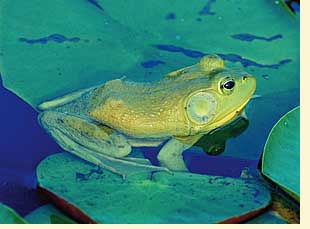When Parasites Spur
New Breeding Habits
Parasites can harass and even decimate amphibian populations, but Brian Todd believes they might also spur the beleaguered creatures to evolve new and sometimes bizarre breeding strategies.
 Todd, a researcher in UGA’s Odum School of Ecology, explains that most amphibians—tadpoles, for example—start their lives in water, make their way onto land as adults, and return to the water to breed. Yet there are other breeding strategies as well. Take the Darwin’s frog, which swallows its eggs and a few weeks later regurgitates its young. Or the marsupial frog, a species that carries its eggs on its back until they hatch. Several species lay eggs in small puddles on land or high up in trees, where they bypass the larval stage entirely and hatch as miniature versions of adults.
Todd, a researcher in UGA’s Odum School of Ecology, explains that most amphibians—tadpoles, for example—start their lives in water, make their way onto land as adults, and return to the water to breed. Yet there are other breeding strategies as well. Take the Darwin’s frog, which swallows its eggs and a few weeks later regurgitates its young. Or the marsupial frog, a species that carries its eggs on its back until they hatch. Several species lay eggs in small puddles on land or high up in trees, where they bypass the larval stage entirely and hatch as miniature versions of adults.
Researchers have often hypothesized that natural selection favored these nontraditional breeding strategies as a way to avoid predatory fish or the risk of a breeding pond or stream drying up. But in a review article published in the November 2007 issue of The American Naturalist, Todd argues that the diversity of reproductive strategies that amphibians employ might also be influenced by the benefits of avoiding viruses, fungi, and other parasites.
“Most parasites known to affect amphibians tend to be aquatic, so there clearly are benefits to using nontraditional breeding strategies,” said Todd.
He points out that breeding in ponds or streams tends to concentrate amphibians in the same place at the same time, which increases parasite transmission. And the process of metamorphosis it undergoes in such environments decreases the young amphibian’s immunity, another factor that benefits parasites.
Todd said the idea that parasites can influence reproductive strategies is testable. Given that a disease caused by a chytrid fungus is currently causing amphibian-population declines in Central and South America, researchers could examine the populations over time to determine whether species with nontraditional breeding habits were less affected. Scientists could also compare the parasite loads in traditional and nontraditional breeders.
Of course, there are benefits to breeding in the water—most important is that there is plenty of food. But Todd contends that when the death rate from parasites, or any other aquatic threats, exceed the benefits that come from rapid growth, natural selection begins to favor strategies that shorten the aquatic life cycle phase or eliminate it altogether.
“The role of parasites has been overlooked until now,” said Todd. “I want to highlight the idea that they might be important to evolution so that people can begin studying amphibians in a new light.”
For more information, contact Brian Todd at: btodd@uga.edu
 |
